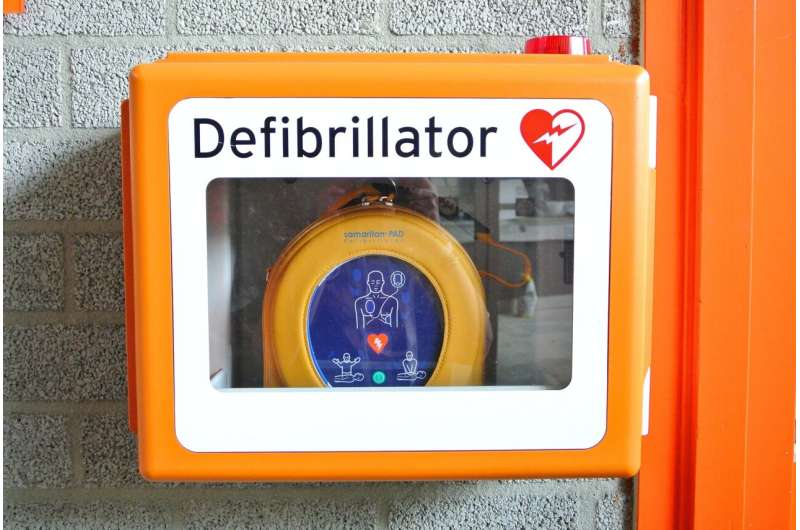This article has been reviewed according to Science X's editorial process and policies. Editors have highlighted the following attributes while ensuring the content's credibility:
fact-checked
proofread
Defibrillators used in just 10% of out-of-hospital cardiac arrests, study shows

Defibrillators are being used in just one in 10 cardiac arrests where the lifesaving devices are available, according to new research presented at the British Cardiovascular Society Conference in Manchester.
The research drew upon data from the East of England Ambulance Service and The Circuit, the national defibrillator network developed by the British Heart Foundation (BHF). The Circuit maps the location of defibrillators across the whole of the UK, so that emergency services can direct bystanders to the nearest defibrillator in the event of a cardiac arrest.
They then analyzed the density of defibrillators across geographical areas, the number of cardiac arrests, as well as the frequency that defibrillators were used from April to September 2022.
The results found that 1,649 cardiac arrests occurred in the East of England in the six-month period. Public access defibrillators were available (within 500m of the cardiac arrest) in 1,302 (79%) cases, but only used in 132 (10%) of cases.
The researchers say these findings underline the need for better education and awareness around defibrillators, so that they are used more frequently.
The study, from researchers at the Essex Cardiothoracic Center (CTC), part of Mid and South Essex NHS Foundation Trust (MSEFT), and Anglia Ruskin University (ARU) also found that there are fewer defibrillators in more deprived areas, compared to the most affluent.
The researchers overlayed data on defibrillator density and cardiac arrests with data from the 2019 index of multiple deprivation. This revealed that Luton, the most deprived area in the East of England had the lowest rates of defibrillators in the region, with 16 defibrillators per 100,000 people, compared to the mean for the East of England of 72 per 100,000 people.
There are more than 30,000 deaths from out-of-hospital cardiac arrests in the UK each year, and fewer than one in 10 people currently survive. Prompt CPR and defibrillation can more than double someone's chances of survival.
Dr. Thomas Keeble, Consultant Cardiologist at Essex CTC which is part of MSEFT, and Associate Professor at Anglia Ruskin University said,
"Our study highlights strikingly low numbers of publicly available defibrillators being used in the event of a cardiac arrest in the east of England area, which suggests that much more needs to be done to promote awareness and education around CPR and defibrillation. It is also concerning to see far fewer defibrillators in the most deprived areas—such a finding should prompt further discussion about more consistent and effective placement of defibrillators in communities."
Judy O'Sullivan, Director of Innovation in Health Programs at the British Heart Foundation said, "Prompt CPR and defibrillation from bystanders can be the difference between life and death, so it is concerning to see low rates of defib use. There are many known reasons for the low use of defibrillators, including not having enough bystanders available at the scene of an emergency, difficulty in accessing a defibrillator at the time when it is needed, or fear of it using it. More needs to be done to encourage people to use these life saving devices when they are available."
"We also know there are thousands of unregistered defibrillators which means their location is not known to the ambulance services. We are calling upon everybody who owns or looks after defib to register it on The Circuit today—this could help save someone's life."
Dr. Simon Walsh, Medical Director at the East of England Ambulance Service Trust said, "The East of England Ambulance Service Trust has been working with The Circuit to maximize the number of maintained Public Access Defibrillators on our Computer Aided Despatch system, and since September 2022 we have added a further 1,534 PADs to the database.
"We have also expanded our community first responder and staff responder schemes with the aim of increasing the likelihood that someone will be able to locate the nearest PAD to a patient in cardiac arrest. We continue to work closely with the Essex Cardiothoracic Center and other partner organizations in the East of England to improve outcomes of cardiac arrests in our communities."




















